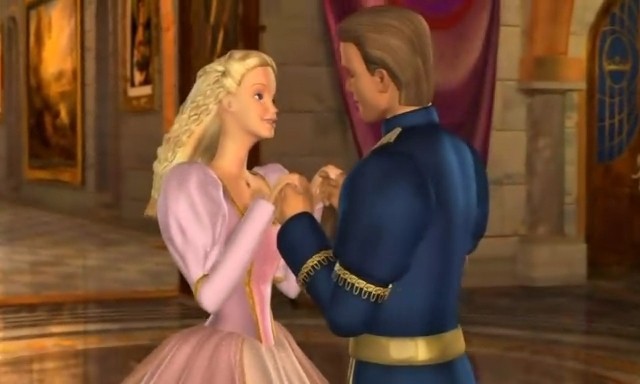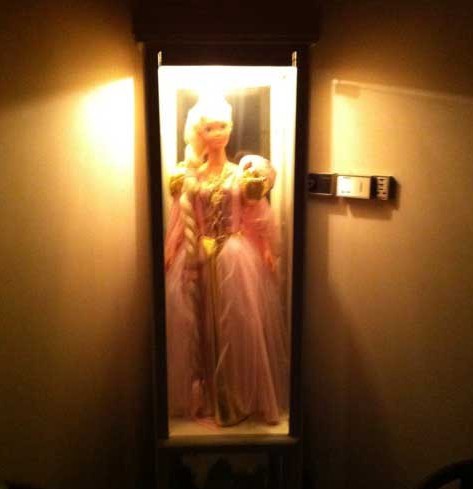When Barbie Came To Live With Us
When Barbie Came To Live With Us
by Rakesh Satyal

As happens with many gay men, my childhood was rendered infinitely brighter and more flamboyant by the presence of Barbie. But the biggest Barbie moment of my life centers around not me, but my parents.
As long as I can remember, my mother has had a fascination with Barbie dolls. As an Indian immigrant, she viewed them as flawless examples of Americana. Once, when our young next-door neighbor added an Indian Barbie to her fledgling Barbies of the World Collection, I thought that my mother’s tiny head would pop off at this conflagration of East-meets-West madness. Another time I remarked on her excitement as she was gift-wrapping a Malibu Barbie to give to a family friend’s young daughter. She told me, with a seriousness that I had seen from her only on the day that Rajiv Gandhi passed away, “I vant to keep it for myself.”
On the other hand, my father, too masculine and utilitarian-minded for a preoccupation with toys, has always been the world’s most direct gift giver, especially when it comes to my mother. He rather infamously gave her a pot to cook in for their anniversary — three years in a row. That my father was a carnivore and my mother a strict vegetarian Brahmin seemed to make this transaction all the more strained. So, the summer after my junior year of high school, as my parents’ anniversary loomed large, I quite naturally expected pot #4 to make its way onto our stove.
Back then, I used to perform in a regional youth theater program during the summers. Rehearsal was held an hour from our home, and every day at 5 p.m., I would wait in the foyer for my friends to pick me up. We would drive an hour to the theater, rehearse for four hours, then come back very late, usually after midnight. One August afternoon, as I was waiting impatiently for my friends to arrive, my father appeared at the top of the stairs and called to me excitedly, “Rakesh! Rakesh, come up here!”
“Dad, I have to leave soon,” I said.
“Just come up here von second!” I had rarely seen him so animated.
I climbed the stairs to the master bedroom to see my father leaning on a five-foot-tall hot pink Mattel box. I mean, at the age of six — OK, fine, twelve — I might have been elated to behold this fluorescent miasma, what with the half-dozen Barbies hiding under my bed at that time. But as a man of a certain teen-age, I was not prepared for it. This was the equivalent of a heterosexual teenager who had played with Hot Wheels in his youth entering to find a Porsche where a four-poster bed had once stood.
Contained in this gargantuan fluorescent rectangle was what was known as a My Size Barbie: Rapunzel Edition. The conceit here was that little girls (or truly “adventurous” little boys) could play with Barbie, then denude her and sport her gold lamé-and-pink chiffon gown themselves, as well as pluck off her long, platinum-blonde braid and wear it as a weave, regardless of their own hair color — and presumably undisturbed that they were leaving Barbie bald and naked on the ground.
“Vell, isn’t she something!” my dad said, beaming almost as brightly as the lamé.
Clearly, I was speechless.
This did not deter my father in the least. “So,” he said, “you’re artistic…” (Translation: You’re gay and I don’t know it yet.) “Fix ‘er up!”
This is how, at almost 17, I found myself froofing My Size Barbie’s clothing while my father watched, pride shooting out of his face. I attached the braid — I wanted to bounce it in the air like a newly anointed Oscar winner and say, “Oh! It’s heavy!” — and as I slid my hand through Barbie’s skirts to give them extra volume, I wondered if I could secretly melt Barbie, then refashion her fleshy goo into a thousand normal-sized dolls that I could subsequently distribute to the children of Calcutta.
As you might imagine, the presentation of the Barbie to my mother was met with incredulity and confusion, not least because the doll wasn’t far from my mother’s height.
My mother opened her eyes — which she had been instructed to keep closed as my father positioned Barbie just-so in our family room, an alien princess intergalactically transported to our Persian rug — and her face bore such an unreadable expression that my two brothers and I had to bite our lips in anticipation of her reaction. My dad gestured broadly at the doll like one of Barker’s Beauties on The Price Is Right.
“Oh! It’s… it’s… great!” our mother chimed, and for a long, long moment, I could not tell what percentage of that exclamation was genuine and what percentage pejorative. But then her expression shifted, and she soon wore a look of childlike fascination, the same look I had seen when the Indian Barbie of the World had crossed her path years back. She seemed truly impressed by Barbie, struck by the sort of punch-drunk appreciation of grandeur that pretty, shiny things have a tendency to engender in people.
No sooner had Barbie entered our lives than she was disappearing. Telling my mother he was putting the doll away “for safekeeping,” my father tucked Barbie under his arm and marched away, like some Indian reinvention of the lingerie leg saga in A Christmas Story. I half-expected my mother to raise a hand in farewell.
Somehow, in the whirlwind of rehearsing for my show (it was Peter Pan, and I was playing Captain Hook, which, FYI, is the gayest character ever), I was able to forget about Barbie for a few days. However, one night, after a very long rehearsal, I came home at almost one in the morning to a house darkened with sleep and nighttime quiet. I let myself in the side door and was puzzled to see a nightlight glowing in our parlor. Who, I thought, was staying with us? My parents hadn’t mentioned any visitors. I tiptoed to the other end of the house and peered around the corner.
I screamed.

Unwilling to let Barbie go through life without appropriate fanfare and tribute, my father had bought a six-foot-tall, fitted curio cabinet to house Her Long-Tressed Majesty. Barbie was now mounted on a stand, a light shining down and half-illuminating her painted features so that they resembled those of a prettier, taller version of the Bride of Chucky, Barbie had never looked more terrifying.
Barbie has remained in this position for almost 15 years. She is undoubtedly the most prominent object — no, presence — in our house, and she is one of the first things that any new guest inspects. There she stands: a Satyal-household matriarch and a steadfast, ostentatious but heartfelt metaphor of my father’s love for my mother. It only recently occurred to me just how committed my father had to be to bring her to us. Think about it. He had to go to Toys”R”Us — a public place; hoist the Barbie onto a counter — in public; pay upwards of $130 for her — publicly; and then drive her home in his car — through yet more public places. Of course, in terms of journeys, my parents’ immigration from a faraway land beats Barbie’s trip from Toys”R”Us to our house. But just barely.
To this day, whenever I visit my parents, I have a great urge to wait until they leave the house and then refashion Barbie with one of my mom’s old saris and a bindi, just to give her some cultural relevance. But, fitting all too gladly into some gay stereotype, I have never been one to lightly discard lamé and chiffon. Perhaps, somewhere in the world, maybe even in New Delhi, there is a My Size Ken pining away for a lost love, and who am I to change his beloved? Ken may never be reunited with Barbie now that she belongs to us, but thankfully, after almost 40 years of marriage, my parents still have each other.
Rakesh Satyal is the author of the Lambda Award-winning novel Blue Boy.
Still from Barbie as Rapunzel.
